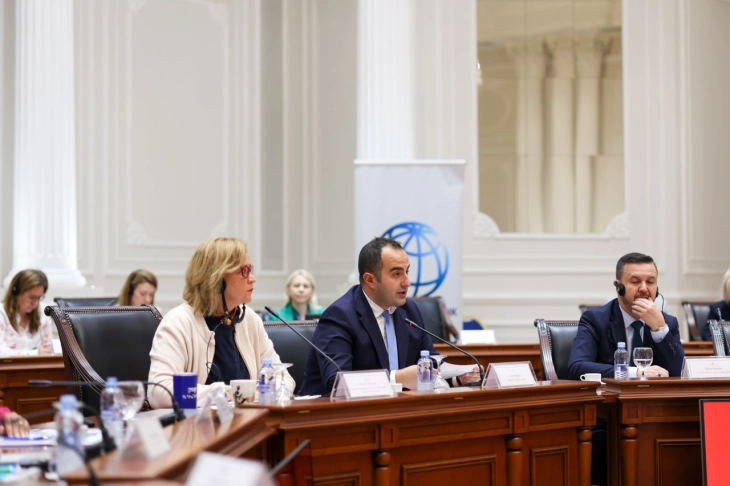Shaqiri: Working on optimization of school network and new formulas to finance primary and secondary education

Skopje, 10 November 2022 (MIA) - Optimization of the school network in primary education and creation of new formulas to finance primary and secondary education are among the key components of the plan to reform the national education system and we are currently working on them together with the World Bank and UNICEF. The goal is better utilization of available resources, achieving greater efficiency and higher quality of the educational system, said Minister of Education and Science Jeton Shaqiri at a debate dedicated to education in the Government on Thursday.
In addition to several ministers and mayors, the UNICEF regional director for Europe and Central Asia, Afshan Khan also took part, together with the permanent representative of this organization in the country, Patrizia Di Giovanni.
Minister Shaqiri emphasized that the money from the state budget allocated for education is constantly increasing by the year and this is to be welcomed, because, as he said, we show a commitment to the development of the sector, to its adaptation to global changes, processes and standards. However, it is necessary to better allocate those funds.
"In the country, we have 347 municipal primary schools, or if we add the regional facilities, that is a total of 975. However, in most of them, we had a decline in the number of students years ago, and this has not been answered adequately and systematically. On the contrary, all schools continue to work, and the number of teachers has even increased in some places. We have a student-school-teacher ratio that indicates there is considerable room for more efficient use of resources. That is why we need optimization of the school network," said Shaqiri.
He emphasized that the optimization does not mean closing schools and dismissing teachers from work.
"Where a school does not function due to a reduced birth rate or migration, together with the local population, another purpose will be found for the facility. It will be ensured that the children from the first to the third grade have classes in their place of residence, and for the children from the fourth to the ninth grade, if there is a need to travel to the nearest central school, adequate conditions and financial means for transportation will be provided. There will always be a need for teachers, especially now, when the new concept for primary education envisages changes to curricula and programs and longer stay and activities of children in school. Thus, a suitable place will be found for each teacher," Shaqiri added.
At the same time, as the minister said, a new formula for the distribution of financial resources is also needed, because the current formula protects schools with a small number of students.
For other schools with a larger number of students, the funds are not enough for all current needs, pointing out they cannot foresee funds for the professional development of teachers, funds for increasing inclusiveness in the school, for the maintenance of facilities, etc.
"With the new formula, we expect to have 4 components. The first is a basic component – which will provide the necessary funds for the functioning of the schools, according to the costs per student, namely funds for salaries, utilities for heating, materials, small inventory and so on. The second is a variable component – which should provide means of transportation for students, technical aides for students from grades 4-9 who are part of socially disadvantaged families and do not have learning devices for digital textbooks, textbooks for students from first to third grades and compensation for students following instruction in a language spoken by smaller ethnic communities. The third is an adjustment component that provides a leveling effect of results obtained from the first two components. And the last one is a development component that will stimulate progress, through compensations for achieving good results, and according to specific parameters," explained Shaqiri.
He voiced expectation that final solutions will be reached soon and they will begin to be applied. He hopes for support from UNICEF and the World Bank in the future as well, because their experience is of great importance for North Macedonia, a developing country that strives to become a developed society, the Ministry of Education and Science said in a press release. dk/ik/







